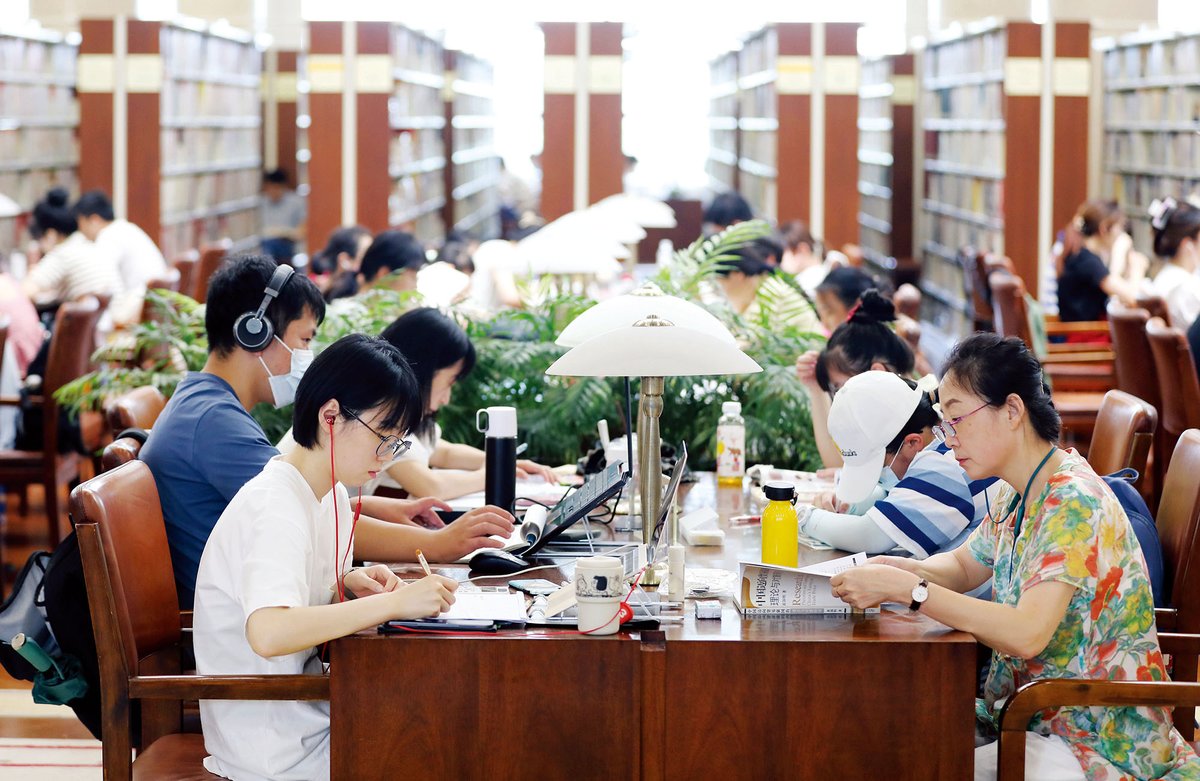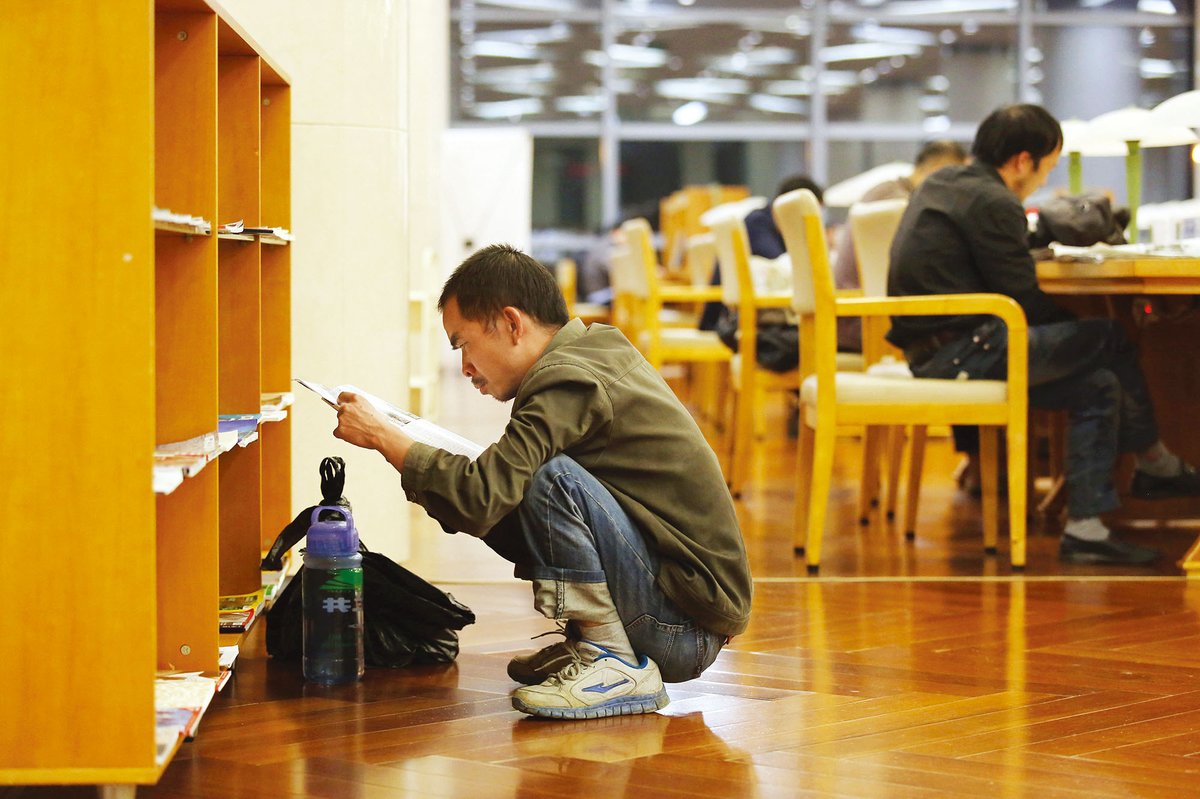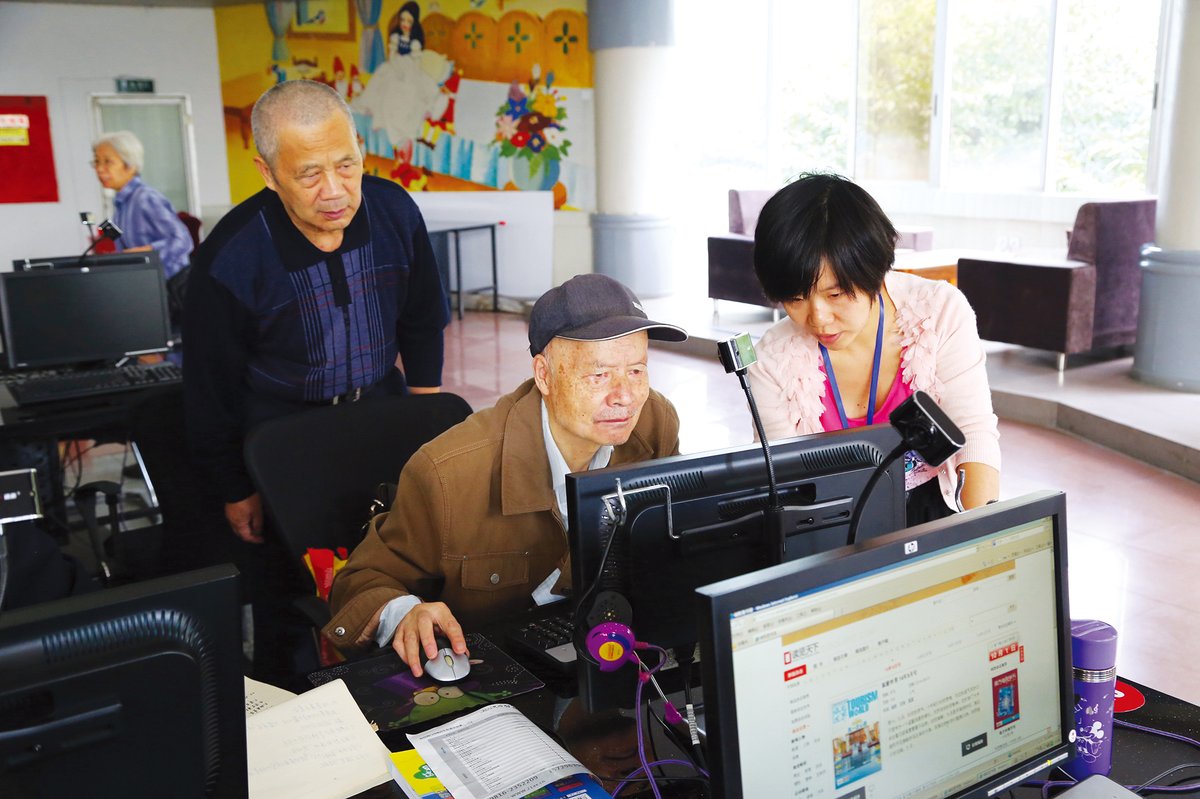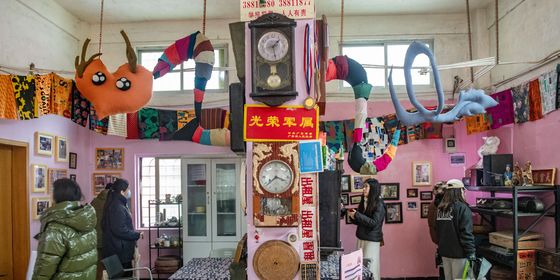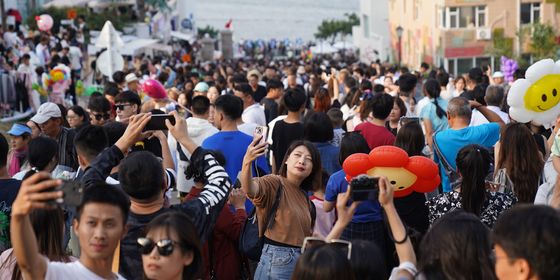China’s public libraries are vital but scarce resources for millions
An hour’s subway ride separates 28-year-old Su Ying from her home in Beijing’s southwestern Fengtai district and what she calls her “hiding” place: the Chaoyang District Library. Her parents don’t know that she was laid off from her job at an education company last December and that she now spends nearly every day at public libraries working on job applications and studying for the national postgraduate exam.
At 10:30 a.m., Su’s usual spot is occupied, forcing her to walk around the library for some time before finding a seat. Surrounding her today, as usual, are people from all walks of life: a middle-aged man in a black suit staring at stock prices on his computer screen; another reading a book about Buddhism and the news on his phone at the same time, a soda in hand. A woman in her 20s is taking notes while watching an online class, and getting annoyed at music filtering through the headphones of a nearby young woman who is watching a TV show on her phone.
For Su, and millions of other ordinary people in China, the country’s 3,212 public libraries (as of the end of 2020, according to statistics of the Ministry of Culture and Tourism) are ideal places for passing time with free wifi, as is now often the case. For the down-on-their-luck or vulnerable, the library can be an escape from overcrowded living conditions, or even a shelter from domestic violence and natural disasters in a nation where such facilities are still in short supply.
But while growing in number and becoming more comprehensive in their services, China’s libraries have yet to meet all the needs of its population. There is just one library for every 438,000 people in China, and most libraries are concentrated in urbanized, economically developed areas (for comparison, the ratio in the US is 1 to 36,000 people). Pandemic restrictions, funding shortages, and concerns for public order have also prevented many libraries from serving as wide a community as they might wish.
Before she discovered libraries, Su’s go-to hangout was a Starbucks near her former office in Chaoyang district. She would buy a coffee and spend a whole day there applying for jobs, reading the news, and watching TV shows. This cost her at least 50 yuan per day, and after 20 consecutive days, she looked for cheaper alternatives in parks, KFC restaurants, and milk tea shops.
A friend finally told her about the National Library in Beijing, which attracted her because it was “free, air-conditioned, and quiet,” Su tells TWOC.
The modern public library is widely believed to have originated with the Boston Public Library, which was founded in 1854 with the aim that every citizen had the right to access free community services and to educate themselves. China’s first library under this model, different from the imperial archives and private stacks that existed for much of the country’s history, was either the Boone (or Wenhua) Library started in Wuhan by American educator Mary Elizabeth Wood in 1910, or the Hunan Public Library in Changsha, built by entrepreneur Liang Huankui (梁焕奎) and government official Zhao Erxun (赵尔巽) in 1904.
During the Republic of China, besides missionary-founded libraries in major eastern cities, it was fashionable for renowned intellectuals to sponsor libraries in their hometowns. The Communists also operated libraries in their base areas in the Northwest in the 1940s for grassroots ideological, cultural, and scientific education. Some of these libraries hosted lectures, exhibitions, and other activities aimed at eradicating illiteracy.
Many of the country’s current public libraries were built after 1978, when scientific research was high on the agenda amid China’s market reforms. Until 2011, when the Ministry of Culture stipulated that museums and public libraries at the national or provincial level ought to be free to enter, many charged fees for services like looking up reference material or computer use. In 2017, the new National Public Library Law stipulated that several types of service should be provided free of charge for all: inquiries and borrowing, public reading rooms, and access to public lectures, training, and literacy promotion.
By this time, the role of libraries in serving socially vulnerable people was already well-understood by the public. In 2016, the Hangzhou Public Library in Zhejiang province announced that homeless people were welcome to use its services. When some locals complained that these patrons smelled and looked “too ragged,” the library’s director Chu Shuqing famously responded, “I don’t have the right to keep away beggars and scrap collectors, but if you disagree, you have the right to leave.”
Other libraries followed suit and since then, a number of high-profile incidents have entrenched libraries in the public imagination as the standard-bearers for inclusivity and equality in China. Last July, the Zhengzhou Library in Henan province stayed open 24 hours a day for several days to provide shelter for people hit by the devastating floods in the province. In 2020, an article in Portrait magazine recounted the story of a woman with a young daughter who lived in the Dongguan Public Library in Guangdong province for a week, possibly as an escape from domestic violence.
Earlier that same year, the Dongguan Library had gone viral when a migrant worker named Wu Guichun wrote a touching farewell message in its guestbook. Wu had been a voracious reader at the library for 12 of his 17 years in Dongguan, but was reluctantly returning to his hometown as factory work dried up during the pandemic. “Books teach you wisdom. They are the only things in the world that are totally good,” Wu wrote in his message, later telling journalists he chose to spend all his spare time in the library because it was free and air-conditioned, and that the staff didn’t ask for ID or bother him even when he ate amid the stacks. “I will never forget this place as long as I live.”
Besides the use of their space, public libraries are also increasingly taking on bigger roles in the community by offering free public lectures, training courses, and of course, access to books themselves. Since 2011, the Library of Guangxi Zhuang Autonomous Region in Nanning has invited experts to give lectures for unemployed people and migrant workers. In 2019, Shiyan Library in Hubei province hosted a free summer camp where the children of migrant workers could take computer classes and watch movies. From January to February of this year, migrant workers could go to Chongqing’s public libraries for help buying train tickets ahead of the Lunar New Year holidays.
Xu Pan, who works in the publicity department of Yuexi County Library in Anhui province, tells TWOC that there are several tables in her library reserved for seniors and since 2013 they have offered free classes on calligraphy, chess, and other subjects for primary school students. In the Sanming City Library, Fujian province, there are health care lectures for elders and reading classes for children with visual impairments.
Xu tells TWOC that the library has worked hard to minimize disruption while keeping the space open for all visitors. There are readers with intellectual disabilities, who will sometimes drink out of other people’s bottles or shout, but “librarians will pay special attention to these readers and stop them when warning signs occur, and no one has yet complained about them.”
However, not all libraries and patrons have been equally open about who can enter or borrow. In 2013, a library in Zhengzhou introduced a controversial rule that stipulated children under 14 were not allowed to enter as they made too much noise. The National Library in Beijing has also courted criticism since 2008 by only allowing readers above a certain professional level or who hold a postgraduate degree to borrow foreign language books and certain Chinese language books.
There is also disagreement among experts on whether libraries ought to become all-purpose community centers, or focus more on public education. A 2019 op-ed from media outlet East Day called sleeping in libraries “uncivilized behavior.” “From the perspective of promoting public literacy, as soon as people walk into the library, they ought to be intoxicated by the atmosphere of reading and develop the habit of reading,” wrote the author, who suggested librarians should wake and warn sleepers.
Shangguan Xiaomin, a librarian from Fujian’s Sanming City Library, is critical of these attitudes. “Our directors tell us that anytime a person enters the library, they are our reader and can do whatever they want [without disrupting others],” she claims. Wang Yanjun, the Dongguan librarian who publicized Wu Guichun’s story, told Portrait magazine that the library attracted a lot of criticism for putting “Relaxation” first in its motto, “Relaxation, Interaction, Knowledge.” But Wang felt it was well-suited to Dongguan, which has a large population of migrant workers with little education, and felt that some visitors may be encouraged to pick up a book after they’ve enjoyed the air-conditioning and seats for a while.
However, there are still psychological barriers preventing less-educated people from making full use of libraries’ services, or even being aware of them. In another library in Dongguan, 26-year-old librarian Liang Nüsheng remembers several migrant workers in their 40s who came to read, but never borrowed any books, which she attributes to shyness and feeling intimidated by the lending process. “The most important thing is to build an equitable atmosphere and let these disadvantaged people know they have rights to get services,” she tells TWOC. Xu had similar experiences in Yuexi: “A lot of people think libraries are for intellectuals and charge fees for reading, so they are ashamed to come in, just like when [middle-class people] see luxury shops.”
Growing demands from readers have led to libraries trying to expand their services. Each July and August since 2018, Xu’s library has extended its opening hours from 5 p.m. to 9 p.m. to cater to students who come to study during their summer vacation. The library had previously wanted to offer 24-hour services, but this plan foundered due to a lack of staff, facilities, and funding. “It’s not that simple,” Xu explains. “We need to hire people to take the night shift. We need desks, chairs, beds, and more space. Who will give us the funding?”
At the start of the pandemic, libraries nationwide shut their doors. Since then, many have limited their visitor capacity and moved parts of their services online. Xu’s library removed half of its chairs for social distancing and asked visitors to make appointments. Su, in Beijing, tells TWOC that she sets several alarm clocks to remind her to reserve an entry slot as soon as the system opens, but sometimes the spaces are booked out in just five minutes. In addition, mandatory health code and occasional ID checks since the pandemic began have eroded some of the openness of many libraries.
Libraries in suburban and rural areas also fall short. Though the government made constructing rural libraries a priority in 2021, many towns and villages still only have mobile libraries at best. Residents of Yanjiao, a satellite town of Beijing in neighboring Hebei province, have demanded a public library for years, but were finally told by the local culture bureau in 2020 that Yanjiao’s urban classification does not meet the “requirements” to qualify for a library at this time.
For Xu, libraries are indispensable public spaces, and her goal is to make them truly public. “For some, there is still an invisible wall that holds them back from libraries,” she says. “[My question is], how can we help poor and illiterate people become confident enough to enter libraries?”
Perhaps the best attribute of public libraries is that you don’t need to be seeking any higher purpose to use them—or to be seeking anything in particular at all. “[At first] I was always curious why there were so many young people here every day. Don’t they have to work?” says Su. “Now I know everyone is just like me, taking a brief break from their troubles in the corner of the library.”
Reading Spaces: How did Libraries Become Safe Havens for China’s Vulnerable? is a story from our issue, “Public Affairs.” To read the entire issue, become a subscriber and receive the full magazine.







